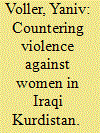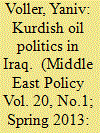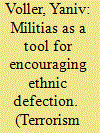|
|
|
Sort Order |
|
|
|
Items / Page
|
|
|
|
|
|
|
| Srl | Item |
| 1 |
ID:
131565


|
|
|
|
|
| Publication |
2014.
|
| Summary/Abstract |
The struggle against gender-based violence in the Iraqi Kurdistan Region has witnessed some significant achievements since the late 1990s. A subject long excluded from public discourse in the region, it has now moved increasingly into the mainstream, compelling the Kurdistan Regional Government (KRG) to take legal and practical measures against such practices as honor killings, female genital mutilation, and domestic violence. This article traces the sources of these shifts in the KRG's stance, looking especially at the role of transnational women's rights networks in the region. It highlights these networks' successful strategy of binding their cause to the KRG's endeavor to legitimize and consolidate its contested sovereignty over the Kurdistan Region. In doing so, the paper addresses an underexplored subject in the literature on women's rights campaigns in the Kurdistan Region and contributes to the study of transnational advocacy as a source of normative change.
|
|
|
|
|
|
|
|
|
|
|
|
|
|
|
|
| 2 |
ID:
145291


|
|
|
|
|
| Summary/Abstract |
This article examines the Egyptian Muslim Brotherhood (MB) movement's stand on the South Sudan question. The aim here is to contribute to the ongoing debate over the MB's moderation. Throughout the civil war in Sudan, the MB consistently objected to South Sudanese secession. Yet, while it had traditionally framed its objection in religious terms, describing the South Sudanese struggle as a Christian conspiracy against Islam, in the decade preceding South Sudan's declaration of independence it moved to base its opposition on more practical grounds, revolving around issues such the absence of democracy, stability and infrastructure in South Sudan. This correlated with wider shifts in the MB. Since the 1990s, the movement has claimed to have undergone a transformation, adopting a moderate, pro-democratic stance. These statements persuaded many scholars that the MB has come to represent political moderation in both its domestic and international agenda. More recent works on the movement, however, have come to question the MB's moderation hypothesis, suggesting that even though the movement has changed its discourse and some aspects of its activism, this could not be seen as a linear process of moderation. This article uses the South Sudan case to further support this critique from a foreign policy perspective. It demonstrates that even though the MB changed its tactics and discourse, its goals remained unchanged— even when the circumstances and the normative environment changed dramatically. Moreover, it shows that at times of crisis, the liberal discourse gave way to the old-fashioned radical discourse of previous decades.
|
|
|
|
|
|
|
|
|
|
|
|
|
|
|
|
| 3 |
ID:
154045


|
|
|
|
|
| Summary/Abstract |
Throughout its existence, the Iraqi Ba‘thist regime engaged in a war against Kurdish insurgents. Declassified Ba‘th Party documents reveal that beyond military means, Baghdad saw identity as a useful resource in suppressing the uprising. The documents tell of a sophisticated divide-and-rule strategy, using bureaucracy, law, and militia recruitment to manipulate the various minority communities in northern Iraq against the rebels and each other. Drawing on these documents, this article provides a detailed analysis of this strategy.
|
|
|
|
|
|
|
|
|
|
|
|
|
|
|
|
| 4 |
ID:
121509


|
|
|
| 5 |
ID:
190879


|
|
|
|
|
| Summary/Abstract |
Ethnic defection and pro-government militias are two recurring features of ethnic conflicts. There is a strong connection between these two elements, with incumbents using militias to absorb defectors from rebel constituencies into their ranks. However, relatively little work has been carried out on this link. Most works exploring ethnic defection have treated these defector militias, as the article refers to them, as the result of ethnic defection. This research offers an alternative hypothesis: Rather than tools for administrating and controlling defection, governments in ethnic civil wars often view militias as a tool for enhancing and facilitating ethnic defection. The socio-political functions of militias may triumph over military ones in governments’ consideration to form and sustain such defector militias. The article employs two case studies to support this hypothesis, these of the ethnic conflicts in northern Iraq and southern Sudan.
|
|
|
|
|
|
|
|
|
|
|
|
|
|
|
|
| 6 |
ID:
185856


|
|
|
|
|
| Summary/Abstract |
In recent years, the relations between weak central governments and armed groups in the periphery have attracted great attention. Rebels, warlords and other actors have not only undermined the authorities' grip on power, but gradually come to shape the nature of governance and political system in their countries. Warlordism, rebelocracies and aliocracies are just a few of the political systems identified by students of conflict and armed groups. However, the literature has generally overlooked one category of armed groups and their implications on political order: pro-government militias (PGMs). As PGMs have become ubiquitous in civil wars, this article identifies a new political order emerging in countries where central governments have become reliant on PGMs in counter-insurgency operations. The article defines this order as a militiatocracy. Unlike armed groups in other political orders, PGMs do not seek to overthrow, undermine or replace the central government. Instead, in militiatocracies, PGMs and central governments develop symbiotic relations, which on the one hand help the government to survive an insurgency, but on the other allow militia leaders to secure an increasing presence in politics. The article illustrates the emergence and nature of militiatocracies by employing the case of Syria during the civil war.
|
|
|
|
|
|
|
|
|
|
|
|
|
|
|
|
| 7 |
ID:
165692


|
|
|
|
|
| Summary/Abstract |
A remarkable feature of the Southern Sudanese liberation movement during the First Sudanese Civil War was its use of anti-colonial discourse and tactics. Soon into their struggle, the Southern Sudanese came to depict their situation as colonisation by the Muslim-Arab elite in Khartoum. As this article argues, this adoption of anti-colonial identity was the outcome of Southern Sudanese interaction with neighbouring Arab and African first-generation liberation movements, through which the future leaders of the Southern Sudanese liberation movement observed and absorbed the practices used against European colonialism. When the Southern Sudanese launched their liberation struggle, these practices shaped their struggle.
|
|
|
|
|
|
|
|
|
|
|
|
|
|
|
|
|
|
|
|
|